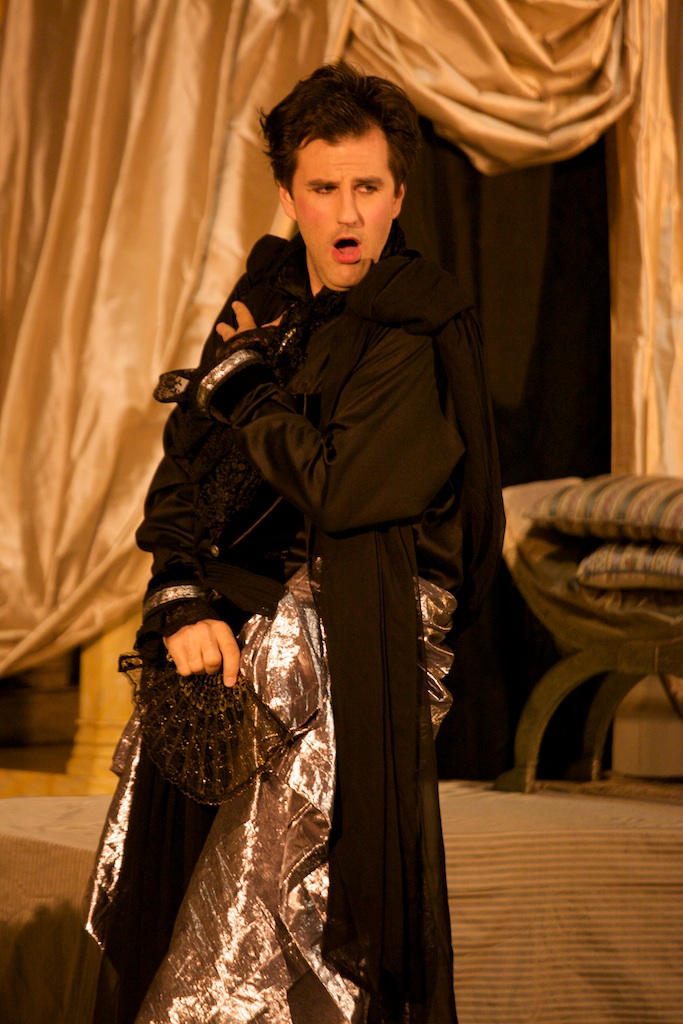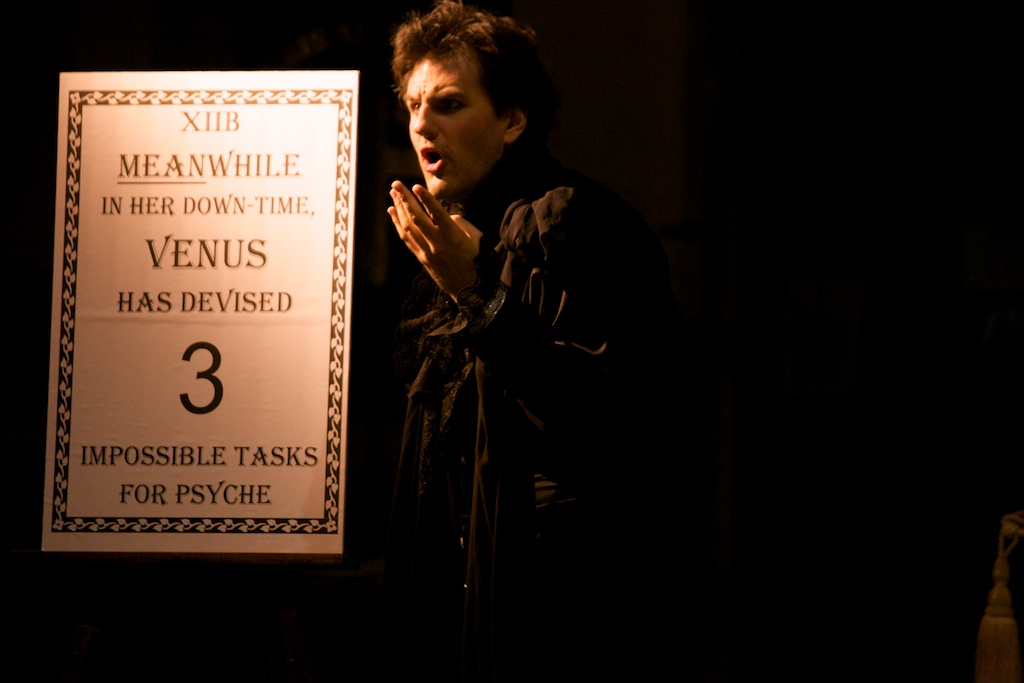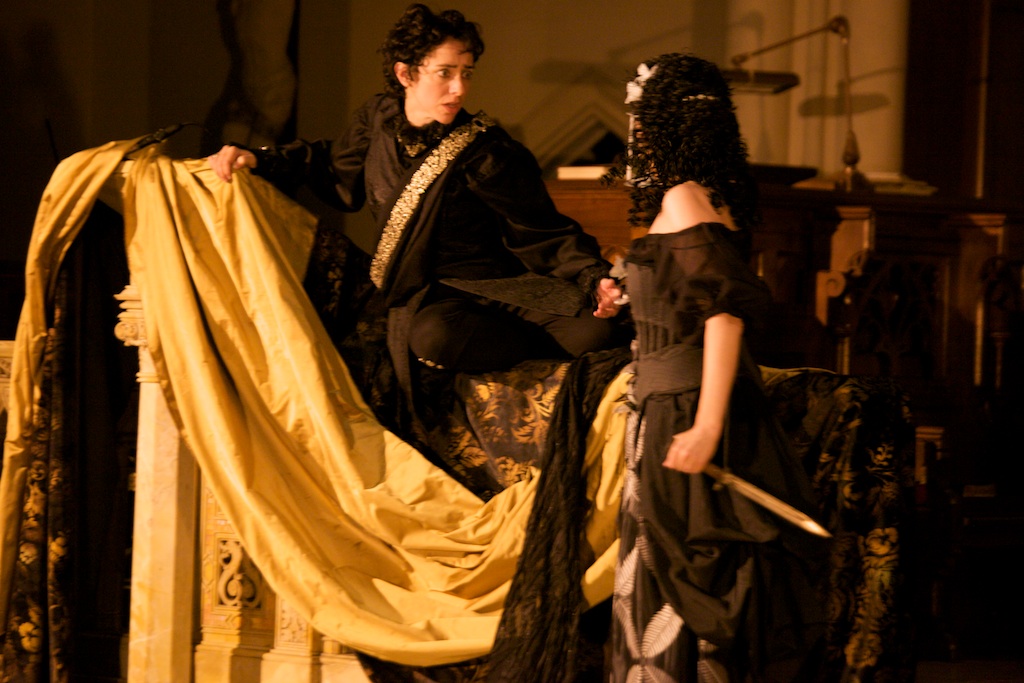“A successful pastiche opera requires a creative chef to blend disparate ingredients into a satisfying whole, like “Amor & Psyche.””
The pasticcio opera Amor & Psyche mixes elements of vaudeville, opera seria, slapstick and tableau vivant into a subtle and witty parody of baroque opera in all its gender-crossing over-the-topness. Drawn from the baroque obsession with Antiquity, the story depicts the myth of Cupid, god of love, and his marriage to the mortal princess Psyche. The piece was constructed by overlaying the music of thirteen composers spanning two hundred years onto the tale. English Lute songs, secular cantatas, as well as Italian and German baroque opera and oratorio have all been plundered in the making of this work.
Vaudeville-style placards denote scene changes and provide additional background and commentary to move the action along and assist audience comprehension. Staged and Costumed.
Forces for Amor & Psyche:
- 3 singers (Amor, Psyche, and Everyone Else)
- chamber ensemble of 3 instrumentalists
Running time:
- 70 minutes of music, intermission optional
Amor & Psyche debuted in August 2010 on the program series “Playthings of the Gods” presented by Vertical Player Repertory.
“… masterfully hodge-podged together into a truly eclectic, trilingual masterpiece.”
“ Even if you don’t love, or even like opera, you will enjoy Amor and Psyche. It is funny, it is touching, and it is thoroughly entertaining.”







+ Program Notes
After a Cliff’s Notes–style introduction of the characters and a somewhat random vocal overture (Lamento di tre amanti), the action begins as we find ourselves in a wooded glen near the palace of Psyche’s father. Psyche (which means “butterfly” in Greek) is a mortal girl whose beauty has caused worshippers to abandon the temples of the goddess Venus and pay homage to her instead, pissing Venus off. Oblivious to the danger she is in, Psyche blithely catches her little namesakes near her home (La Farfalletta).
Spying on Psyche from directly overhead, the irate Venus blows a lot of hot air around, calling on all the forces of nature and her son, Amor, to avenge her against this young upstart (Fire, fire; Furibondo spira il vento). The blood-thirsty Amor, a.k.a. Cupid, a.k.a. the god of love, absolutely lives for this kind of gig and, in a fit of over-achievement, agrees to wreak general havoc on mortals and gods alike. He also agrees to shoot the girl with one of his arrows and cause her to fall in love with a monster (his pièce de résistance) (Volaro, feriro). Instead, things go terribly awry when he is accidentally pricked with the arrow himself and falls madly in love with Psyche (All’armi; Son vinto). Mother and son harmonize with varying degrees of sanguinity about the risks Love runs when plotting the downfall of Innocence (Cosi` va).
In the meantime, Psyche’s father has sought the advice of the Oracle at Delphi regarding what to do about her. His other, far less lovely, daughter has already made a brilliant marriage to a king, but sad, sorry Psyche’s suitors seem stand-offish. Hmmm. The oracle’s prognosis is that Psyche, having displeased a goddess, must be taken to a mountainous crag to await Death. Naturally, this causes some distress to both father and daughter who lament their fate (O Grief; Son nato a sospirar).
Amor has plans of his own and, as soon as he can shake off his mother, he blows in on the Zephyr to carry Psyche off to his palace (more specifically, his boudoir). Somewhere along they way, they get married, so it’s okay J (Lady if you so spite me). Psyche enjoys all the benefits of being married to the god of love, but with one proviso (pay close attention): She is not allowed to look at him (Dormono l’aure estive).
Things go well with the marriage until Psyche’s jealous sister shows up… (Guerra, guerra; Daphne was not so chaste) …and asks questions which Psyche has trouble answering, like, “What does your husband look like?” She plants the terrible seed of doubt in Psyche’s breast which immediately grows to enormous proportions (the seed, that is) (Gelosia; Toss not my soul).
Fearing he might be an awful monster, which he, of course, is not (Editor’s note: quite the opposite, as a matter of fact!), Psyche takes a lamp and decides to check her husband out while he sleeps, with disastrous results (Farfalletta semplicetta (pt.1); Fuggi, parti). Love cannot live where there is no Trust, so he flees. At this critical juncture, our distraught heroine is ready to end it all(Farfalletta semplicetta (pt. 2)).
After an unsuccessful suicide attempt, Psyche is discovered by the demi-god Pan on his way home from a night of carousing. Pan is a lusty sort of half-goat/half-man type who likes a pretty girl as much as the next half-goat/half-man type, and he seeks to cheer her up with a song and a dance. (Der Rheinische Wein tanzt gar zu fein).
Having somewhat won over the listless Psyche, Pan continues to entertain the crowd while our prima donna goes off to perform three impossible labors dreamed up for her by Venus who is still nursing a serious grudge (Coridon in Geldnöten). Although it seems Psyche has managed to complete her assigned tasks, she blows it at the last minute by deciding to try some of Persephone’s Beauty Powder for herself. Not meant for mere mortals, this powder causes her to fall into a deep sleep reminiscent of Shakespeare’s Juliet.
Amor is languishing without Psyche and is searching for her (Idolo del mio core). Fortunately having better political connections than Romeo, he appeals to Jove himself who, touched by Amor’s unwavering devotion and Psyche’s determination to make amends, grants permission for her to join the immortals on Olympus. But first, he comments at length on the situation (Love stood amazed; Amor nel tuo penar).
And so, Amor wipes the sleep from Psyche’s eyes (Awake, sweet love).
They’re really happy (Caro, cara).
Then, in a rollicking trio, Jove, Venus and Pan give their take on it (Away with you self-loving lads).
Everyone has a good laugh. (Laughing Chorus).
+ Musical Selections
- Introduction (instrumental with added commentary) Nicola Porpora (1686 – 1768) * * from the cantata “Odi qual fasto”
- Lamento di tre amanti (terzetto) Antonio Lotti (1667 – 1740) from “Duetti, Terzetti, e Madrigali a Piu` voci”- Venice 1705
- La Farfalletta (aria – Psyche) Francesco Mancini (1672 – 1737) from the cantata “La Farfaletta”
- Fire, Fire (song – Venus) Thomas Campion (1567 – 1620) from “The Third Booke of Ayres” London 1617
- Furibondo spira il vento (aria – Venus) G. F. Handel (1685 – 1759) * * from the opera “Rinaldo”- London 1711
- Volaro
, feriro(aria – Amor) Alessandro Stradella (1639 – 1682) * * from the cantata morale “Otia si tollas periere Cupidinis arcus”- Genova 1680 - All’armi (fragment - terzetto) Stradella (ibid.)
- Son vinto... Cosi` va (duetto – Amor & Venus) Stradella (ibid.)
- O Grief (song – Psyche’s Father) John Coprario (? c. 1570 – 1626) from “Songs of Mourning”- London 1613
- Son nato a sospirar (duetto – Psyche & father) Handel * * from the opera “Giulio Cesare”- London 1724
- Lady if you so spite me (song – Amor) John Dowland (1563 – 1626) from “A Musicall Banquet” 1610
- Dormono l’aure estive (duetto – Amor & Psyche) Francesco Durante (1684 – 1755)
- Guerra, Guerra (fragment – terzetto) Stradella (“Otia...Cupidinis arcus” again)
- Daphne was not so chaste (song – Psyche’s sister) Dowland
- from “The Third and Last Booke of Songs or Aires” London 1602/03
- Gelosia (duetto – Psyche & sister) Pietro Soresina (18th century)
- Toss not my soul (song – Psyche) Dowland from “The Second Booke of Songs or Ayres” London 1600
- Farfalletta semplicetta (aria – Psyche) Giuseppe Savatelli (18th century) from the cantata “Farfaletta semplicetta” (manuscript)
- Fuggi, parti (fragment – terzetto) Stradella (still from “Otia...arcus”)
- Farfaletta semplicetta (continued) Savatelli
- Der Rheinische Wein tanzt gar zu fein (song – Pan) Adam Krieger (1634 – 1666)
- Coridon in Geldnöten (song – Pan) Johann Philipp Krieger (1649 – 1725) from the opera “Flora”
- Idolo del mio core (aria – Amor) Porpora from the cantata “Idolo del mio core”
- Love stood amazed (song – Jove) Dowland from “The Third and Last Booke of Songs or Aires”- London 1602/03
- Amor nel tuo penar (aria – Jove) Handel from the opera “Flavio”- London 1723
- Awake sweet Love (song – Amor) Dowland from “The First Booke of Songes or Ayres”- London 1597
- Caro, cara (duetto – Amor & Psyche) Handel from the opera “Atalanta”- London 1736
- Away with you self-loving lads (song – Jove, Venus & Pan) Dowland from “The First Booke of Songes or Ayres” 1597
- Laughing Chorus (terzetto) Handel from the oratorio “L’Allegro, il Pensieroso ed il Moderato”- London 1740
+ Cast and Production
- Hayden DeWitt (mezzo-soprano) — Amor
- Beth Anne Hatton (soprano) — Psyche
- Alan Dornak (countertenor) — Venus, Pan, Jove, Psyche’s father and sister
- Kelly Savage, harpsichord
- Vita Wallace, violin
- Motomi Igarashi, viola da gamba
“Great performance last night — the singing was excellent and the music selections for the pasticcio were spot on. Enjoyed Alan’s channeling of his inner Charles Busch as Venus and Paul as a guide for the perplexed. But most of all, the lovely ensembles were — ravishing!”

